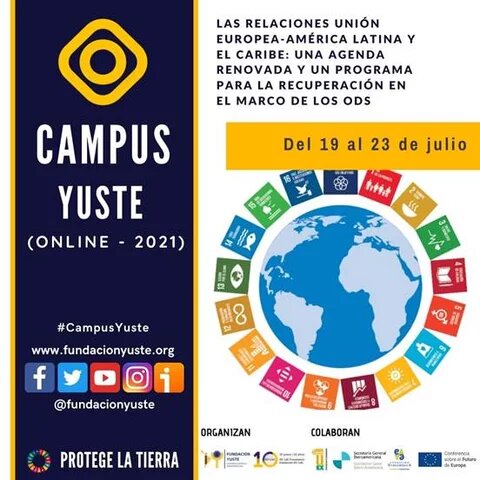Aiming to analyse the current situation and seeking answers within the framework of the 2030 Agenda and the SDGs, as well as examining the development of a renewed agenda in the relations between the European Union, Latin America and the Caribbean that contributes to addressing common challenges, the European and Ibero-American Academy of Yuste Foundation and EU-LAC Foundation organised the course “European Union-Latin American and the Caribbean Relations: A Renewed Agenda and a Programme for Recovery under the SDGs”.
This event was held online from 19 to 23 July, as part of the programme of Campus Yuste’s international summer/autumn courses and in the framework of the Conference on the Future of Europe.
The opening of the course was on Monday 19, at 16:00 pm and counted the Rector of the University of Extremadura, Antonio Hidalgo García; and the Executive Director of the EU-LAC Foundation and co-director of the course, Adrián Bonilla.
The Ibero-American General Secretary, academic of Yuste and co-director of this course, Rebeca Grynspan, gave the inaugural speech “European Union-Latin America and the Caribbean Relations: A Renewed Agenda and a Programme for Recovery under the SDGs”.
During the five sessions that made up the course, possible options were explored to work on a programme for the recovery of Latin America, in the framework of the SDGs, and the development of a renewed agenda in the European Union’s relations with Latin America and the Caribbean were analysed, taking into account the return to multilateralism, and the development of initiatives linked to climate change and digital development as possible valid instruments for the management of global problems valid for the relationship between Europe and Latin America and the Caribbean.
Before the pandemic, Latin America and the Caribbean had recorded their lowest period of economic growth in the last seven decades after years of economic growth at high rates. The Covid-19 health emergency has aggravated the situation by increasing extreme poverty to figures unknown in the last decade. It has also particularly affected the gender of women, leading to a decline of more than 10 years in the situation of women with regard to gender equality and loss of opportunities and access to the labour market. There are, furthermore, large inequalities and a strong external dependence on health, low internet access, and climate change has significant effects on the region. In addition, there is a lack of funding to address this crisis.
This situation leads to occasional political and social uncertainty in some countries of the region. Historical experience at global level has illustrated that economic and social crises have political consequences.
The preservation of democratic governance and the protection of equal access to services, as well as inclusion policies, and the promotion of a new social pact seem to be central at the moment.
The course featured the participation, among other speakers, of the President of the EuroAmerica Foundation and academic of Yuste, Ramón Jáuregui Atondo; the acting minister and Deputy Minister of Energy and Environmental Quality of Costa Rica, Rolando Castro-Córdoba; the Co-Chair of the Euro-Latin American Parliamentary Assembly, Oscar Darío Pérez Pineda; the Deputy Executive Secretary of the Economic Commission for Latin America and the Caribbean (ECLAC), Mario Cimoli; the President of EU-LAC Foundation, Leire Pajín; former President of Costa Rica, Luis Guillermo Solís Rivera; the Ambassador of Costa Rica to the UN, Rodrigo Alberto Carazo; the Head of the Regional Americas Division in the European External Action Service, Claudia Gintersdorfer; the Ambassador of Mexico to Belgium and the European Union, Rogelio Granguillhome Morfin; the Dean of the Faculty of Economics of the University of Havana (Cuba), Antonio Romero Gómez; and the Member of the European Parliament and Chair of the Delegation to the EU-Chile Joint Parliamentary Committee, Inmaculada Rodríguez-Piñero Fernández.
About 200 people from 20 countries enrolled in this course: Argentina, Belgium, Bolivia, Brazil, Chile, Colombia, Costa Rica, Cuba, Dominican Republic, Ecuador, France, Italy, Mexico, Nicaragua, Peru, Portugal, Spain, Ukraine, USA and Venezuela.
This course had the collaboration of the Ibero-American General Secretariat (SEGIB), EuroAmerica Foundation and the University of Extremadura.
